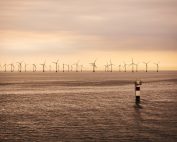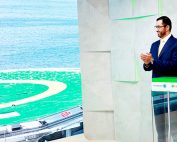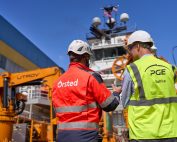

Baltic Stakeholder Conference 2024
February 29, 2024
Registration is now open for the Baltic Stakeholder Conference 2024 as well as the parallel youth event that will take place online during the conference. Both of these events will take place on 29 February 2024.
The Baltic Stakeholder Conference 2024 is set to bring together experts, policymakers, and enthusiasts to discuss and shape the future of the Baltic Sea region.
Official registration for the event is now open, and will close on 31 January 2024, so secure your spot now.
During the registration process, attendees are encouraged to select one workshop session for the morning and another for the afternoon, so that their experience can be tailored based on their personal interests and preferences.
The event will be hybrid (in-person and online), with the in-person component taking place at:
Hanaholmen, Swedish-Finnish Cultural Centre, Hanasaarenranta 5, 02100 Espoo, Finland
The in-person event promises an engaging platform for discussions, networking, and collaboration among stakeholders invested in the well-being of the Baltic Sea region.
In parallel with the main conference, a special youth event is also scheduled for individuals aged between 16-22.
This youth-focused event aims to provide a platform for the younger generation to actively participate in conversations and contribute to discussions that will shape the future of the Baltic Sea.
Don’t miss the opportunity to be part of this significant conference. Sign up now. Your voice matters!
Programme (links to presentations and recordings will be available after the event)
Moderator: Rogier Elshout, Moderating.EU, The Netherlands
| Time | Baltic Stakeholder Conference 2024 | Youth Conference: Challenge the status quo: redefine our relationship with nature |
| 09:00-10:00 | Registration | |
| 10:00-11:00 | Plenary | Plenary |
| 11:00-13:00 | Block 1: Workshop sessions | Youth conference Facilitated by Rogier Elshout, Moderating.EU How can we redefine our relationship with nature? What are we at risk of losing? What is the Baltic Sea worth to you? |
| Management Updating management guidelines for marine protected areas (MPAs), developing a methodology for management effectiveness assessment and testing it in national case studies. |
||
| Spatial modelling Creating high-resolution environmental datasets for the Baltic Sea and project future species and habitat distributions to inform conservation and management strategies. |
||
| Ecosystem services Developing a versatile methodology to assess, map and value ecosystem services. The project will inform marine conservation, optimize marine spatial protection for MPAs and other effective area-based conservation measures (OECMs), and identify key areas for ecosystem service production, demonstrating their socio-economic value and guiding future assessments. |
||
| Legal frameworks for planning marine spaces Assessing and aligning international and EU legal frameworks with Baltic Sea Action Plan targets, evaluating compatibility with directives such as the Birds and Habitats, Marine Strategy Framework, and Common Fisheries Policy. |
||
| MPA Portal Building and updating a regional portal with information on MPAs and OECMs. Employing agile development methods, the process ensures alignment with the needs of MPA managers and users, integrating key functionalities and data models to enhance regional capacity in marine protection. |
||
| 13:00-14:30 | Lunch | Lunch |
| 14:30-16:30 | Block 2: Workshop sessions | Youth conference |
| Restoration Contributing to the development of a Regional Restoration Action Plan and toolbox, highlighting regional priorities, methods, costs, and feasibility in regard to restoration efforts. |
||
| Governance Fostering a shared regional understanding of marine spatial protection, establishing common terminology and setting ecologically relevant protection targets and indicators. It also identifies threats and pressures on ecosystems and assesses the efficiency of existing protection measures. |
||
| Monitoring Reviewing the existing monitoring systems for marine spatial protection in the Baltic Sea, exploring innovative monitoring tools and methods, and developing a comprehensive framework and guidelines for the entire MPA network. |
||
| Coherence Revising criteria for assessing the coherence of marine spatial protection, aligning them with scientific knowledge and environmental goals, and develops connectivity models to understand species and habitat interactions. The work assesses the MPA network, emphasizing representativity, replication, adequacy, and connectivity, with a focus on species and habitat distribution. |
||
 |
MPA Europe Baltic Sea Regional Stakeholder workshop MPA EUROPE will present their results to date on classifying marine ecosystems, modelling species and habitat distributions and mapping blue carbon stores. They will also invite stakeholders to begin to co-identify use cases for their maps, final atlas and results. |
|
| 16:30-17:00 | Coffee and tea break | Coffee and tea break |
| 17:00-17:50 | Plenary | Plenary Recommendations and visions from the youth conference |
| 17:50-18:00 | Closing of the conference | Closing of the conference |







